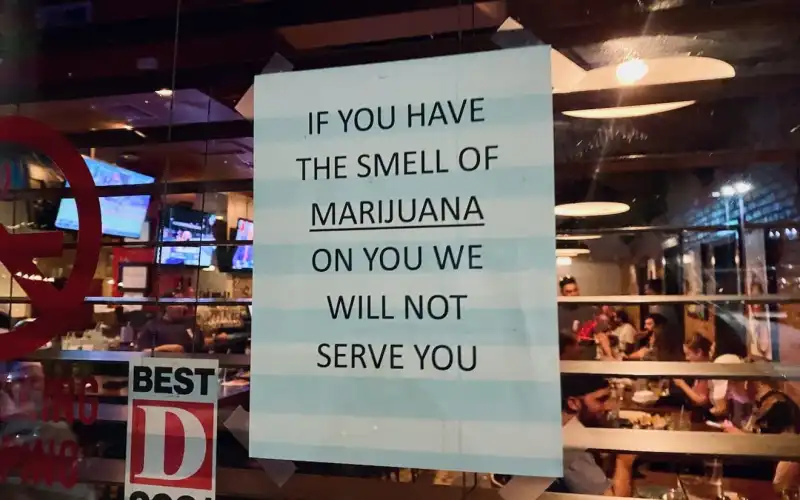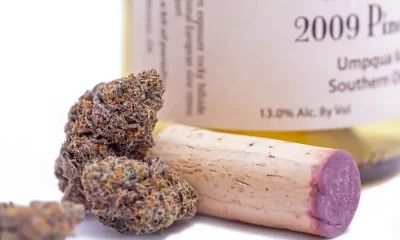Business
Dallas Restaurant Warns Customers: ‘If You Have The Smell of Marijuana, We Will Not Serve You’

There are 4/20-friendly establishments, and then there are spots like E-Bar in Dallas.
Tex-Mex restaurant E-Bar has been the talk of the town for its anti-stoner policy that is spelled out in a sign posted on its window: “If You Have The Smell Of Marijuana On You We Will Not Serve You.” (“Marijuana” is underlined for good measure.)
The signage has drawn recent attention, including in a story published Wednesday by The Dallas Observer.
But the owner of the restaurant, Ernie Quinlantan, told the publication that the policy has actually been enforced for five years. The Observer noted that sometimes “when the windows are cleaned, the sign gets taken down, then is put back up in a place that is not quite so obvious.”
“People reeking of marijuana, it just ruins everybody’s experience around them, you can’t possibly have a great meal with someone who has that much odor,” Quinlantan told the Observer.
Quinlantan also downplayed the significance of the rule, saying that most customers are unbothered.
“Some people have something to say, it depends on the person, but most of the time it’s not an issue,” Quinlantan said.
The rule has not gone over well on social media, however. E-Bar’s Instagram account is filled with announcements, including multiple posts reminding customers to wear a mask at the restaurant. Another proudly displays an award naming E-Bar the best Tex-Mex restaurant in Dallas three years ago.
But the comment sections of many of the account’s posts have been littered with sarcastic remarks and outright anger directed at the rule.
“Congrats on being the only [Tex Mex] restaurant to monetize the Latino culture while also diminishing it by supporting stigmas rooted in associating cannabis with the Latino community by calling it marijuana,” wrote one Instagram user. “Do you think none of your staff or family consume cannabis?”
“Do you have a list of smell restrictions?” snarked another commenter “Also, is the person smelling customers certified by the SCA (Sniffers Commission of America)?”
Recreational cannabis is illegal in the Lone Star State, of course, but change could be afoot.
Last November, voters in five Texas cities approved ballot measures to decriminalize pot. In one of those cities, Denton, officials ignored the will of the electorate and voted in June “against adopting the ordinance that would have decriminalized marijuana.”
Polls show that a majority of Texans are in favor of lifting the prohibition on marijuana use.
A Dallas Morning News/University of Texas at Tyler Poll last August found that 55% of registered voters in Texas support the legalization of adult-use cannabis.
Thirty-four percent said they “strongly” support the legalization of recreational cannabis for adults, and 21% said simply that they support the change, according to the poll.
Fourteen percent said they were simply opposed, with 21% saying they were “strongly” opposed. Another 9% said they neither supported nor opposed the idea.
So far, the legalization effort has not gained much traction among Texas lawmakers in Austin. But the legislature has taken steps to broaden the state’s medical cannabis program.
In April, members of the state House of Representatives signed off on a bill that would allow physicians to recommend medical cannabis as an option for chronic pain treatment rather than opioids.
“Passage of this legislation will provide qualified patients with a state-sanctioned option to access a therapy that has proven to offer significant benefits,” the NORML chapter of Texas said at the time. “Medical cannabis is an objectively safer alternative to the array of pharmaceutical drugs that it could potentially replace. I urge my fellow Texans to voice their support for this important legislation and to reach out to their Senators to encourage their backing as it moves through the legislative process.”
Business
New Mexico cannabis operator fined, loses license for alleged BioTrack fraud

New Mexico regulators fined a cannabis operator nearly $300,000 and revoked its license after the company allegedly created fake reports in the state’s traceability software.
The New Mexico Cannabis Control Division (CCD) accused marijuana manufacturer and retailer Golden Roots of 11 violations, according to Albuquerque Business First.
Golden Roots operates the The Cannabis Revolution Dispensary.
The majority of the violations are related to the Albuquerque company’s improper use of BioTrack, which has been New Mexico’s track-and-trace vendor since 2015.
The CCD alleges Golden Roots reported marijuana production only two months after it had received its vertically integrated license, according to Albuquerque Business First.
Because cannabis takes longer than two months to be cultivated, the CCD was suspicious of the report.
After inspecting the company’s premises, the CCD alleged Golden Roots reported cultivation, transportation and sales in BioTrack but wasn’t able to provide officers who inspected the site evidence that the operator was cultivating cannabis.
In April, the CCD revoked Golden Roots’ license and issued a $10,000 fine, according to the news outlet.
The company requested a hearing, which the regulator scheduled for Sept. 1.
At the hearing, the CCD testified that the company’s dried-cannabis weights in BioTrack were suspicious because they didn’t seem to accurately reflect how much weight marijuana loses as it dries.
Company employees also poorly accounted for why they were making adjustments in the system of up to 24 pounds of cannabis, making comments such as “bad” or “mistake” in the software, Albuquerque Business First reported.
Golden Roots was fined $298,972.05 – the amount regulators allege the company made selling products that weren’t properly accounted for in BioTrack.
The CCD has been cracking down on cannabis operators accused of selling products procured from out-of-state or not grown legally:
- Regulators alleged in August that Albuquerque dispensary Sawmill Sweet Leaf sold out-of-state products and didn’t have a license for extraction.
- Paradise Exotics Distro lost its license in July after regulators alleged the company sold products made in California.
Golden Roots was the first alleged rulebreaker in New Mexico to be asked to pay a large fine.
Source: https://mjbizdaily.com/new-mexico-cannabis-operator-fined-loses-license-for-alleged-biotrack-fraud/
Business
Marijuana companies suing US attorney general in federal prohibition challenge

Four marijuana companies, including a multistate operator, have filed a lawsuit against U.S. Attorney General Merrick Garland in which they allege the federal MJ prohibition under the Controlled Substances Act is no longer constitutional.
According to the complaint, filed Thursday in U.S. District Court in Massachusetts, retailer Canna Provisions, Treevit delivery service CEO Gyasi Sellers, cultivator Wiseacre Farm and MSO Verano Holdings Corp. are all harmed by “the federal government’s unconstitutional ban on cultivating, manufacturing, distributing, or possessing intrastate marijuana.”
Verano is headquartered in Chicago but has operations in Massachusetts; the other three operators are based in Massachusetts.
The lawsuit seeks a ruling that the “Controlled Substances Act is unconstitutional as applied to the intrastate cultivation, manufacture, possession, and distribution of marijuana pursuant to state law.”
The companies want the case to go before the U.S. Supreme Court.
They hired prominent law firm Boies Schiller Flexner to represent them.
The New York-based firm’s principal is David Boies, whose former clients include Microsoft, former presidential candidate Al Gore and Elizabeth Holmes’ disgraced startup Theranos.
Similar challenges to the federal Controlled Substances Act (CSA) have failed.
One such challenge led to a landmark Supreme Court decision in 2005.
In Gonzalez vs. Raich, the highest court in the United States ruled in a 6-3 decision that the commerce clause of the U.S. Constitution gave Congress the power to outlaw marijuana federally, even though state laws allow the cultivation and sale of cannabis.
In the 18 years since that ruling, 23 states and the District of Columbia have legalized adult-use marijuana and the federal government has allowed a multibillion-dollar cannabis industry to thrive.
Since both Congress and the U.S. Department of Justice, currently headed by Garland, have declined to intervene in state-licensed marijuana markets, the key facts that led to the Supreme Court’s 2005 ruling “no longer apply,” Boies said in a statement Thursday.
“The Supreme Court has since made clear that the federal government lacks the authority to regulate purely intrastate commerce,” Boies said.
“Moreover, the facts on which those precedents are based are no longer true.”
Verano President Darren Weiss said in a statement the company is “prepared to bring this case all the way to the Supreme Court in order to align federal law with how Congress has acted for years.”
While the Biden administration’s push to reschedule marijuana would help solve marijuana operators’ federal tax woes, neither rescheduling nor modest Congressional reforms such as the SAFER Banking Act “solve the fundamental issue,” Weiss added.
“The application of the CSA to lawful state-run cannabis business is an unconstitutional overreach on state sovereignty that has led to decades of harm, failed businesses, lost jobs, and unsafe working conditions.”
Business
Alabama to make another attempt Dec. 1 to award medical cannabis licenses

Alabama regulators are targeting Dec. 1 to award the first batch of medical cannabis business licenses after the agency’s first two attempts were scrapped because of scoring errors and litigation.
The first licenses will be awarded to individual cultivators, delivery providers, processors, dispensaries and state testing labs, according to the Alabama Medical Cannabis Commission (AMCC).
Then, on Dec. 12, the AMCC will award licenses for vertically integrated operations, a designation set primarily for multistate operators.
Licenses are expected to be handed out 28 days after they have been awarded, so MMJ production could begin in early January, according to the Alabama Daily News.
That means MMJ products could be available for patients around early March, an AMCC spokesperson told the media outlet.
Regulators initially awarded 21 business licenses in June, only to void them after applicants alleged inconsistencies with how the applications were scored.
Then, in August, the state awarded 24 different licenses – 19 went to June recipients – only to reverse themselves again and scratch those licenses after spurned applicants filed lawsuits.
A state judge dismissed a lawsuit filed by Chicago-based MSO Verano Holdings Corp., but another lawsuit is pending.
Source: https://mjbizdaily.com/alabama-plans-to-award-medical-cannabis-licenses-dec-1/
-

 Business2 years ago
Business2 years agoPot Odor Does Not Justify Probable Cause for Vehicle Searches, Minnesota Court Affirms
-

 Business2 years ago
Business2 years agoNew Mexico cannabis operator fined, loses license for alleged BioTrack fraud
-

 Business2 years ago
Business2 years agoAlabama to make another attempt Dec. 1 to award medical cannabis licenses
-

 Business2 years ago
Business2 years agoWashington State Pays Out $9.4 Million in Refunds Relating to Drug Convictions
-

 Business2 years ago
Business2 years agoMarijuana companies suing US attorney general in federal prohibition challenge
-

 Business2 years ago
Business2 years agoLegal Marijuana Handed A Nothing Burger From NY State
-

 Business2 years ago
Business2 years agoCan Cannabis Help Seasonal Depression
-

 Blogs2 years ago
Blogs2 years agoCannabis Art Is Flourishing On Etsy











